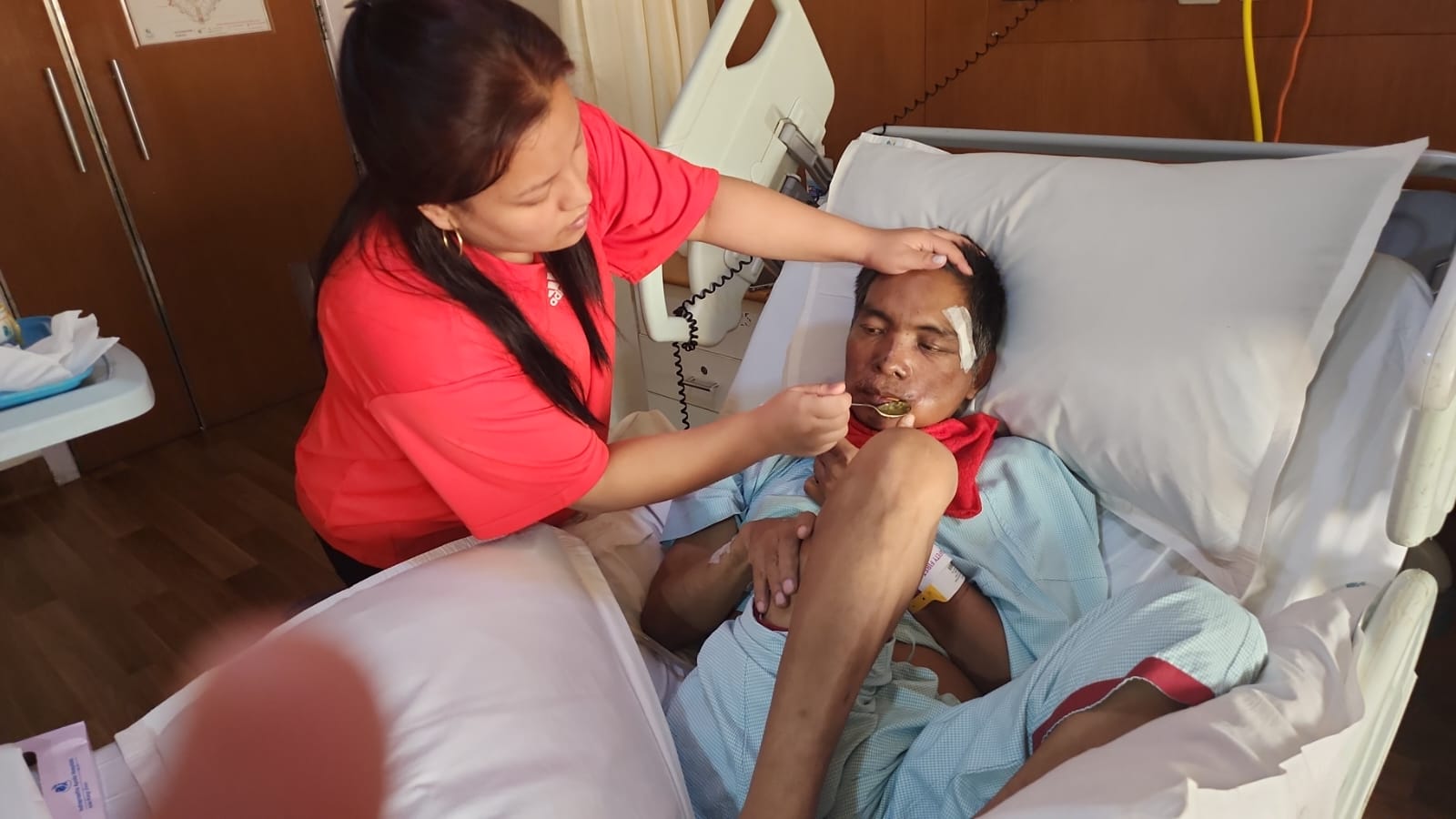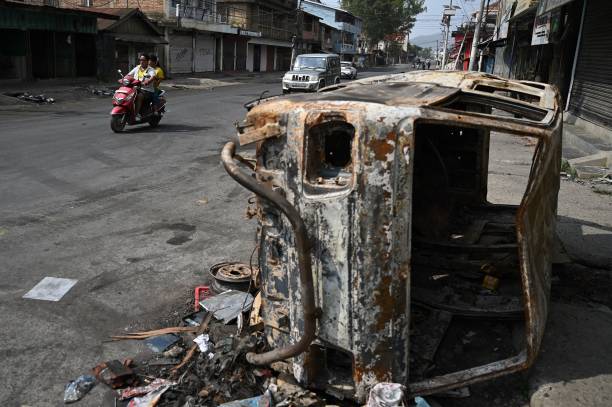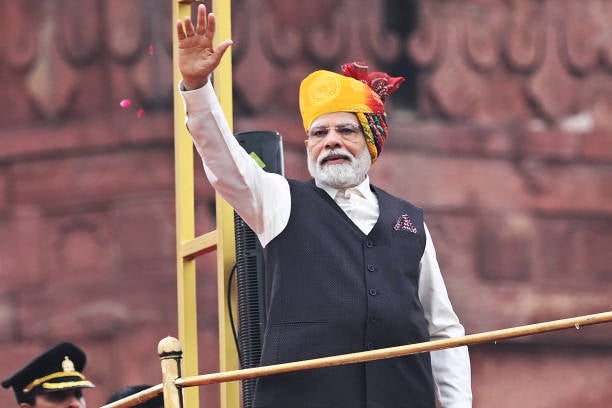The politician beaten, electrocuted and left paralysed by a mob: ‘He cannot sit, talk or even eat on his own’
Exclusive: From university students to a state legislator with Narendra Modi’s own ruling party, no one has been spared the violence that has brought this corner of India to the brink of civil war. Namita Singh reports from Manipur


Nursing student Chiingsianching Khongsai was folding clothes in her halls of residence when she first heard the sounds of the mob outside. She had seen news headlines about the ethnic violence spreading across India’s Manipur state the day earlier, but never imagined it would reach the capital Imphal so quickly.
The 19-year-old, a member of the Kuki tribe studying in a city dominated by the majority Meitei community, was in mortal danger. “A mob of seven [Meitei] people were banging on the hostel gate and trying to break in,” she recalls in an emotional interview with The Independent at her home in Pangjol village in Churachandpur.
The mob quickly got inside and started forcing students out of their rooms to gather in the foyer, where they then segregated them into two groups – Kukis and Meiteis. Khongsai was initially mistaken for a Meitei, she says. “I gave a sigh of relief, thinking I am safe.” But as she was walking back upstairs with the Meiteis, one of the men from the mob asked for her identity card again.
“The moment he read my name and the district I come from, he realised I am not one of them.”
Manipur has effectively been split in two since the sectarian violence began in early May, with Kukis and Meiteis taking up arms and setting up border checkpoints to protect their territory. What started with protests by the minority Kukis against state benefits and job quotas being extended to the majority Meiteis has exploded into a vicious conflict, with at least 180 killed and tens of thousands of people displaced.
Khongsai says the Meitei mob put her and one other Kuki girl into a boys’ dormitory, where they sat gripped by fear. As they waited she received a phone call from her brother back home in Churachandpur, who was worried for her safety. “When my phone rang I braced myself, and then told him that it might be our last call. I bid him my final goodbye. I had to end the call quickly as the screaming from the mob increased.”

A college official arrived, pleading with the mob to let the students go. “But they said that if she called the police, they would not spare her [from violence] either.”
The next few moments felt like they lasted for hours, says Khongsai, as the mob entered the dormitory and dragged her out, through the foyer and into the street outside.
As they attacked her, members of the group shouted: “You are illegal immigrants from another country,” as she would later tell the police in a written complaint. Anti-immigrant rhetoric has inflamed the crisis in Manipur, with Meiteis accusing the Kukis of entering the country illegally from neighbouring Myanmar.

“They started to beat me up brutally, hit me, punched me, took me away outside the hostel and thrashed me,” she says. “The men were fighting to take turns to beat us, like dogs fighting over bones.
“I am an Indian national,” she tells The Independent. “It was nothing but a hate crime.
The mob was armed with iron rods, knives and guns but someone gave the order not to shoot, she recalls. “One woman asked why we were still alive. [She said] that they should chop us to pieces and kill us. Another woman told the mob to burn us.”
Khongsai collapsed and lost consciousness. To this day she has no idea how she survived. “They probably left us thinking we died,” she says.

She woke up at a hospital some 18 hours after the attack, with no recollection of how she got there. “The police or some good samaritan probably dropped us at the hospital.” Even at the largest hospital in the state capital, Kuki victims of the violence were not safe. The army were arranging evacuations and took Khongsai to Imphal airport, from where she was flown to Delhi for further treatment.
More than 80 days later, the scars from the incident have largely faded but the fear of what happened remains. Asked if she would consider returning to Imphal to finish her studies, she shudders. “No, I am scared, I don’t think I will ever feel safe enough to return. I don’t think I will ever leave Churachandpur again.”
India’s opposition has criticised the Narendra Modi government for failing to contain the conflict, which threatens to devolve into an entrenched civil war. Modi’s ruling Bharatiya Janata Party (BJP) are also in power in Manipur’s state assembly and the failure to tackle the crisis is a dent in his strongman reputation with a general election due early next year.

The collapse of law and order in the state is such that even elected state assembly members from Modi’s BJP have been victims of lynching attempts. On 4 May, BJP politician Vungzagin Valte was on his way home from a meeting with chief minister N Biren Singh when his car was ambushed by men the family believes belonged to the Meitei community.
Valte, who comes from the Kuki community, was beaten and given electric shocks, says his son Joseph Valte. “They left him tied up to a rod. Nobody knows who brought him to the hospital,” he tells The Independent.
With the left side of his face crushed and his skull damaged, Valte was airlifted to Apollo Hospital in Delhi, where he spent weeks on a ventilator fighting for his life, says Joseph. A CT scan revealed that he suffered severe nerve damage, leaving his left side completely paralysed.
“My mother’s tears don’t stop when she sees my dad… he is still bedridden today. He cannot sit, talk, walk or even eat on his own.”
With no hope of returning home any time soon, the family now lives in a rented apartment in Delhi.
Expressing his shock over the violence, Joseph says: “We are scared to go back to Imphal. We were living there peacefully, you know. I was born in Imphal but right now it is impossible for us to live there.
“My father’s official home has been attacked and damaged. Our belongings have been looted. We are all very scared to return.”
The violence has led to the internal displacement of at least 50,000 people who are now living like refugees in overcrowded relief camps across the state. Among those forced to leave their homes and live in these camps is 57-year-old Mema.
She was forced to leave her village in Ekao, Imphal East and escape with whatever she could carry after her home was attacked by Kukis earlier in May, she says. “It all happened so quickly that we all ran for survival, escaping with whatever means possible.”

The journey via road was not safe, so she along with other villagers escaped through the shoulder-deep Iril river.
“We did not even carry an extra piece of clothing,” she says. “My grandchildren almost drowned in the river. I had to hold them by their collar to ensure their heads remained above water.”
It was night-time when the violence in her village broke out. From the banks of the river, when she saw all the houses on fire, she could no longer tell which was the one where she lived with her husband for four decades.

“When the homes were going up in flames, I suddenly remembered that the pictures of my dead husband were there. The mandir [shrine] in that home we built together was there. It was all burnt down. I was left with nothing. It now feels like I am surviving just for the heck of it.”
Mema suffers from a heart condition and fainted after the family reached safety across the river. “I could carry on no longer. There were not any relief camps that had come up by that time.
“Thankfully, a woman took me in for a few days, nursed me to health and dropped me off to the relief camp after the facilities were made.”
Now, all she has is a bed with a mosquito net, placed in a big hall that she shares with hundreds of people displaced from across the state. “I am back to being a daily wager, knitting carpets and doormats all day so I can earn around Rs 1,000 (£10) a month,” she says.

With the Indian Armed Forces struggling to prevent the ongoing violence despite the deployment of more than 10,000 additional troops to the state, a growing number of people are taking up arms on both sides of the conflict to protect the areas under their control.
In order to do so, some parents have left their children in relief camps, hoping they will at least be safe there.
In the town of Lamsang located on the outskirts of Imphal, Rakesh Singh of the Progressive Youth Association group is running one such camp. It is home to 28 children whose parents have left them to go to what they call the “frontline”.
He says many of the children have already witnessed horrific violence and suffer nightmares, or start crying without any clear provocation.
“We have to routinely call doctors who give them medications and evaluate their psychological well-being,” says Singh. “We try to ensure that children go back to their normal lives, with regular classes here, games periods and so on. But we can do only as much.”
One of the students is 12-year-old Liaja. Her parents dropped her off from Phayeing on 31 May, to keep her away from the violence unfolding across the state. But she is finding it difficult to adjust to the sudden changes unfolding around her, says Singh.
“She seldom talks to anyone. While other children have returned to normal classes, she just cannot go. She starts to pull her hair [and] cry. She gets very angry very quickly and has these outbursts that she cannot explain. While other children love to talk about their home, parents, friends and school, she is not one of them.
“She does not like to be asked about her mother or father. When we ask her what happened, all she manages to say is she is very angry.
“With children seeing conflict like this, it is bound to traumatise them for life,” he says.
Join our commenting forum
Join thought-provoking conversations, follow other Independent readers and see their replies
Comments
Bookmark popover
Removed from bookmarks